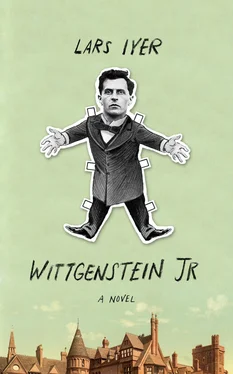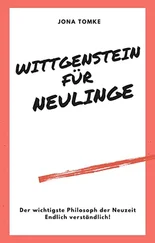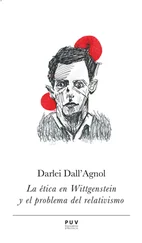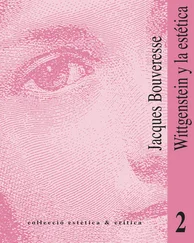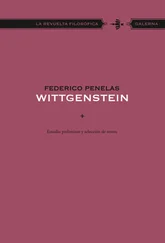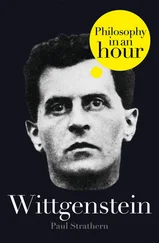The dons drew all their strength from the English lawn, Wittgenstein says. They were always sure of things on the English lawn. You could never best a don on the English lawn. You would only break your lance tilting at a don on the English lawn.
Of course, the English lawn was ultimately provincial , Wittgenstein says. The philosophy of the English lawn was concerned exclusively with English lawn issues , which is to say with nothing of any real importance. Nothing really mattered in English-lawn philosophy, he says. Nothing was really at stake in English-lawn thought. The don was a lawn-head ! No more than a lawn-head!
But perhaps there was something to the world of the dons, Wittgenstein says. Perhaps there was something to be said for donnish amateurism, for donnish pottering-about. Perhaps there was a value to pass-the-port philosophy. To home-counties philosophy! Perhaps there was a freedom to the English don — no German stuffiness, no French pretension …
The old world! The old dons! The old lawn — spreading into the distance! The old dream of a Jerusalem to be built on England’s green and pleasant land!
The English lawn is receding, Wittgenstein says. And with it, the world of the old dons of Cambridge.
New housing estates, where once was open countryside … A new science park where once were allotments and orchards … New apartment blocks near the station, their balconies in shade … And towering barbarisms: Varsity Hotel, looming over Park Parade; Botanic House, destroying the Botanic Gardens; Riverside Place, desecrating the River Cam …
They’re developing the English lawn, Wittgenstein says. They’re building glassy towers on the English lawn. They’re laying out suburbs and exurbs on the English lawn. They’re developing new business parks on the English lawn. They’re constructing Megalopolis on the English lawn.
And they’re developing the English head , Wittgenstein says. They’re building glass-and-steel towers in the English head . They’re building suburbs and exurbs in the English head …
The new don is nothing but a suburb-head , Wittgenstein says. The new don — bidding for funds, exploring synergies with industry , looking for corporate sponsorship , launching spin-off companies . The new don, courting venture capitalists, seeking business partners, looking to export the Cambridge brand . The new don — with a head full of concrete . A finance-head. A capitalist-head.
Do we believe the dons teach at Cambridge? No, they train at Cambridge! Do we believe the dons think at Cambridge? No, they bid at Cambridge! They network . They grub about for money. They ride the waves of global finance.
The new don has sold his soul! Wittgenstein says. The new don has sold his university! The new don has monetised Cambridge! The new don has made Cambridge into an advert .
It was the new dons who made Oxford unbearable for his brother, Wittgenstein says. The new-style philosophers!
English philosophy has become business philosophy, grant-chasing philosophy, his brother told him. The Oxford philosophy department dreams only of being Big Philosophy , his brother said. Of founding Philosophy Parks, of donning philosophical lab coats …
There are Oxford chairs in the desecration of philosophy, his brother told him. In the murder of philosophy. In the destruction of philosophy. In the strangulation of philosophy.
His brother overheard a don use the phrase learning competencies , Wittgenstein says. His brother was asked to demonstrate the real-world applicability of his fundamental work in logic. His brother was expected to make a case for the impact of his thought on the world at large.
His brother said nothing, Wittgenstein says. He kept mute. But he knew he had to leave the high table, and to leave Oxford. He knew he had no choice but to leave England .
Almost all of us have liaisons. Brief encounters, lasting no more than a night. But relationships —no, not really. Never anything that serious. There is never anything that serious at Cambridge. The Cambridge years don’t count. They’re years out, years on holiday. Frivolous years, not part of ordinary life. Cambridge is just a playground …
Brief encounters … One-night stands … One-week flings … One-term relationships … But romance ? Romance has nothing to do with us.
A one-nighter — snog in a club, home in a taxi, pulling off clothes, opening a condom packet, a study-bedroom fuck, bed rocking, bed creaking, staggering home in the dawn. A whole weekend — lying in bed and doing it again, and then again and again. As long as a fortnight — as long as infatuation surges through us, until, one day, lust gets bored, yawns and stretches its limbs …
But Ede’s love for Phaedra (Fee) is entirely different, he says.
He tracked her down, he says. He found her at some dreadful rah birthday party.
Raves are full of posh girls now, waving glowsticks and going all trippy, he says. And the DJs have double-barrelled names.
And there she was, in the middle of it all, Ede says. The sum of all beauty. The centre of the world.
EDE: Do you know what it means to dance, Peters? To really move?
He danced, Ede says. He broke out his moves. He mouthed song lyrics. He acted them out. He was slick. He was funny. She laughed. He smiled. He mouthed, I like you . She looked demure. He mouthed, Shall we go outside? She mouthed, Yes .
Outside into the cool clear night. Fee: the centre of the world. And he, beside Fee, close to the centre. The pair of them, carving out their little channel in space-time.
Everything is true , he thought to himself, as they walked. The stars are hard and bright and true. The moon is true. The night is true …
Remember this , he thought to himself. I am awake and the world is new. Life is alive in me. Life is alive in a new way .
Does she know how beautiful she is? , he thought to himself. She’s Guinevere. She’s Helen of Troy. Wars could be fought over her. Murders committed. Holy vows broken .
I should kneel , he thought to himself. I should fall to my knees. I have been called, like a prophet. I have been chosen. I have a mission. The bells of life are ringing in my ears .
It was as if the world was rocking, Ede says. His knees were weak. To walk was to stagger. The pavement was a ladder mounting upwards.
He laid his coat on her shoulders. She nestled into him. I am Certainty , he thought to himself. I am Protection. I am the Firm Ground . And her heart was the fluttering bird that he wanted to stalk, to catch, to hold, to free …
And later that night, he bared her upper body. Later, he saw her white skin, her breasts, her luminous face, full of everything divine …
Wittgenstein is hoarse this morning. He pulls a tube of cough sweets from his jacket pocket. He unwraps one, and pops it into his mouth.
He speaks of the undoing of logic. Of logic’s deactivation . He speaks of the release of logic, as of captive birds into the wild.
He speaks of giving logic a kind of freedom . A kind of wildness . He speaks of unfettering logic. Of taking off logic’s blinkers. He speaks of letting logic soar up wildly into its own sky …
Logic is lost, that’s the trouble, he says. Logic has got lost. We must lead logic back to itself, he says. We must let logic recover its memories.
Читать дальше
